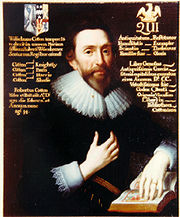
Cotton Baronets
Encyclopedia

The Cotton Baronetcy, of Conington in the County of Huntingdon, was created in the Baronetage of England on 29 June 1611 for the antiquary Robert Cotton
Sir Robert Cotton, 1st Baronet
Sir Robert Cotton, 1st Baronet may refer to:*Sir Robert Cotton, 1st Baronet, of Connington, , the antiquary and MP*Sir Robert Cotton, 1st Baronet, of Combermere , sometime MP for Cheshire...
, who also represented five constituencies in the House of Commons
British House of Commons
The House of Commons is the lower house of the Parliament of the United Kingdom, which also comprises the Sovereign and the House of Lords . Both Commons and Lords meet in the Palace of Westminster. The Commons is a democratically elected body, consisting of 650 members , who are known as Members...
. The second Baronet sat as Member of Parliament
Member of Parliament
A Member of Parliament is a representative of the voters to a :parliament. In many countries with bicameral parliaments, the term applies specifically to members of the lower house, as upper houses often have a different title, such as senate, and thus also have different titles for its members,...
for Great Marlow
Great Marlow (UK Parliament constituency)
Great Marlow, sometimes simply called Marlow, was a parliamentary borough in Buckinghamshire. It elected two Members of Parliament to the House of Commons between 1301 and 1307, and again from 1624 until 1868, and then one member from 1868 until 1885, when the borough was abolished.-History:In the...
, St Germans
St Germans (UK Parliament constituency)
St Germans was a rotten borough in Cornwall which returned two Members of Parliament to the House of Commons in the English and later British Parliament from 1562 to 1832, when it was abolished by the Great Reform Act.-History:...
and Huntingdonshire
Huntingdonshire (UK Parliament constituency)
Huntingdonshire was a Parliamentary constituency covering the county of Huntingdonshire in England. It was represented in the House of Commons of England until 1707, then in the House of Commons of Great Britain from 1707 to 1800, and then in the House of Commons the Parliament of the United...
. The third and fourth Baronets both represented Huntingdon
Huntingdon (UK Parliament constituency)
Huntingdon is a county constituency represented in the House of Commons of the Parliament of the United Kingdom. It elects one Member of Parliament by the first past the post system of election....
and Huntingdonshire in Parliament. The title became extinct on the death of the sixth Baronet in 1752.
The Cotton Baronetcy, of Landwade in the County of Cambridge, was created in the Baronetage of England on 14 July 1641 for John Cotton. The second Baronet sat as Member of Parliament for Cambridge
Cambridge (UK Parliament constituency)
Cambridge is a parliamentary constituency represented in the House of Commons of the Parliament of the United Kingdom. It elects one Member of Parliament by the first-past-the-post voting system....
. The third Baronet represented Cambridge, Cambridgeshire
Cambridgeshire (UK Parliament constituency)
Cambridgeshire is a former United Kingdom Parliamentary constituency. It was a constituency of the House of Commons of the Parliament of England then of the Parliament of Great Britain from 1707 to 1800 and of the Parliament of the United Kingdom from 1801 to 1885. It was represented by two Knights...
and Marlborough
Marlborough (UK Parliament constituency)
Marlborough was a parliamentary borough in Wiltshire, which elected two Members of Parliament to the House of Commons from 1295 until 1868, and then one member from 1868 until 1885, when the borough was abolished.e-1295-1640:-1640-1868:...
in the House of Commons. The fourth Baronet was Member of Parliament for St Germans, Marlborough and Cambridgeshire. The fifth Baronet was a distinguished naval commander. The title became extinct on the death of the sixth Baronet in 1863.
The Cotton Baronetcy, of Combermere in the County of Chester, was created in the Baronetage of England on 29 March 1677. For more information on this creation, see the Viscount Combermere
Viscount Combermere
Viscount Combermere, of Bhurtpore in the East Indies and of Combermere in the County Palatine of Chester, is a title in the Peerage of the United Kingdom. It was created in 1827 for the prominent military commander Stapleton Stapleton-Cotton, 1st Baron Combermere...
.
Cotton Baronets, of Connington (1611)
- Sir Robert Bruce Cotton, 1st Baronet (1571–1631)
- Sir Thomas Cotton, 2nd Baronet (1594–1662)
- Sir John Cotton, 3rd Baronet (1621–1702)
- Sir John Cotton, 4th Baronet (c. 1680–1731)
- Sir Robert Cotton, 5th Baronet (c. 1669–1749)
- Sir John Cotton, 6th Baronet (d. 1752)
Cotton Baronets of Landwade (1641)
- Sir John Cotton, 1st Baronet (1615–1689)
- Sir John Cotton, 2nd Baronet (c. 1648–1713)
- Sir John Hynde Cotton, 3rd BaronetSir John Hynde Cotton, 3rd BaronetSir John Hynde Cotton, 3rd Baronet was an English Jacobite MP. He has been called "one of the most zealous Jacobites in England"....
(1686–1752) - Sir John Hynde Cotton, 4th Baronet (c. 1717–1795)
- Sir Charles Cotton, 5th BaronetSir Charles Cotton, 5th BaronetSir Charles Cotton, 5th Baronet was a senior Royal Navy officer of the French Revolutionary and Napoleonic Wars whose service continued until his death in command of the Channel Fleet from apoplexy in 1812. During his service, Cotton saw action off the Eastern Seaboard of the Thirteen Colonies and...
(c. 1758–1812) - Sir St Vincent Cotton, 6th Baronet (1801–1863)

